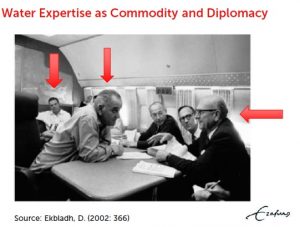Merchandising Water Expertise in the Times of Climate Crisis: “Disaster Capitalism” or Markets for Resilience?
This is a call for project proposals to jointly apply for a Marie Curie Fellowship with Erasmus University Rotterdam as a host (working with dr. Farhad Mukhtarov at International Institute of Social Studies in The Hague). The candidate will have the freedom to shape the project towards his/her own interests, together with dr. Mukhtarov and other researchers at ISS. Below are some ideas that may offer guidance in your application. New ideas along the lines of water governance and the politics of knowledge/expertise are most welcome as well. A secondment at a Dutch non-academic partner is possible: options include a management consulting company, a water company or a regional water authority. Below are some ideas on a possible project within research interests and expertise of Dr. Mukhtarov.
The Rise of Global Hydro-Hubs
This project discusses the rise of Global Hydro-Hubs (GHHs) as part of an on-going scramble for new water-related markets and considers the implications for global solidarity for development. With climate change effects on the rise, demand for water governance expertise soars around the world. This demand offers lucrative business opportunities and various countries have sought to brand themselves as GHHs. GHHs often receive policy support from their home nations and cities, which lend legitimacy to their existence and purpose. However, as GHHs seek to expand their influence, possible tensions between global solidarity for development, geo-political and economic incentives remain understudied and require attention through the lens of critical policy research.
GHHs are nations and cities that brand themselves as centers of excellence in water engineering, management and governance and, by implication, as a natural choice for future clients to turn to with water-related problems. Countries such as USA, UK, The Netherlands, Israel, China, South Korea and Singapore have sought to be seen as GHHs. Aggressive branding, extensive networking and implementation of projects on the ground are some of the strategies that GHHs use to set foot in the new markets. A key narrative that enables the rise of GHHs is the possibility of a “triple-win”, that is, a) promote development by helping client countries solve water issues; b) bring profits to a GHH; and c) advance the geopolitical profile of a GHH as a reliable development partner. Whether the “triple-win” is possible in practice remains an empirical question.
I invite project proposal ideas that reflect any of the issues raised above. More specifically, I invite future post-doctoral researchers to submit an initial idea that reacts to one or more of the following questions. We can then work together to develop this into a workable proposal for a Marie Curie Fellowship (Deadline 12 October).
- Are the triple goals of achieving economic spin-offs, asserting a geopolitical stature and advancing global public goods, such as sustained peace and social justice, compatible with each other?
- What are the major elements, processes, and mechanisms through which GHHs brand their water sector internationally? Such strategies may include but are not limited to: presenting external demand for GHH services as “natural”, packaging past domestic achievements as globally relevant, asserting universality of the GHH expertise, stressing political neutrality of a GHH
- What are the processes and outcomes of water planning and management projects on the ground that have been implemented with support and/or funding by GHHs as part of a larger strategy of branding and merchandising their water sector?
- What are the larger implications of the rise of GHHs for water governance expertise and its mobility, especially with regard to achieving the water related Sustainable Development Goals (SDGs)?
More information on global hydro-hubs is available in this public lecture delivered by dr. Mukhtarov at Alpbach Forum in 2020.
Marie Skłodowska-Curie Doctoral Fellowship
Marie Skłodowska-Curie Doctoral Fellowship is an interesting opportunity for you to collaborate with dr. Farhad Mukhtarov and other researchers from ISS, Erasmus University Rotterdam on the above mentioned research topic for a period of 24-36 months. The post-doctoral fellow must have a doctorate obtained no longer than 8 years ago and have resided not more than 12 months in the previous 3 years in The Netherlands to be able to be hosted at ISS. The proposed research and training need to match with the profile of dr. Mukhtarov. The proposal contains a research and individual training plan, and preferably a secondment with a nonacademic partner of max 30% of the fellowship duration. At ISS we are becoming more successful with this program.
The Marie Skłodowska-Curie program funds personnel costs, mobility and family allowances and includes a good individual research and training and management budget. The duration is minimal 12 and maximum 24 months for fellowships at ISS, and 36 months for fellowships outside Europe including a 12 month return phase at ISS. Submission deadline is 12 October 2021 with the fellowship starting in Fall 2022. The MSCA program is very competitive and only for combinations of the most talented applicants and supervisors.
Please, do get in touch to express your interest by 5 July 2021 in order to decide whether to apply for this opportunity. Expressions of interest can be emailed to Farhad Mukhtarov at mukhtarov@iss.nl
For more information: https://ec.europa.eu/research/mariecurieactions/actions/postdoctoral-fellowships
